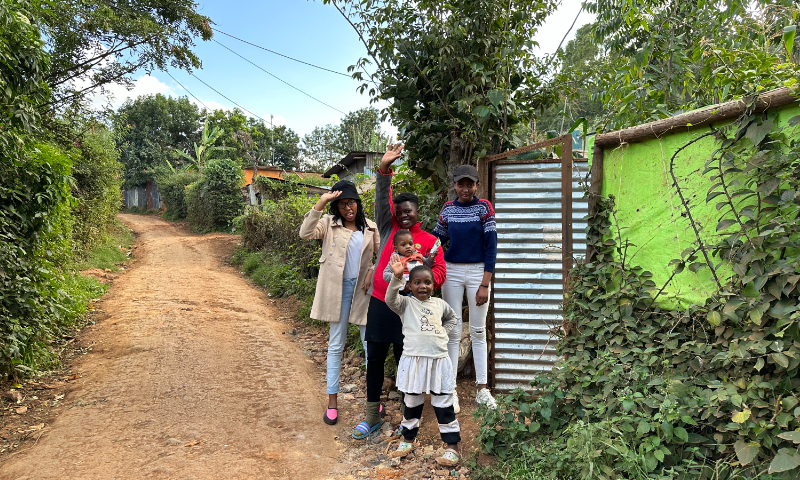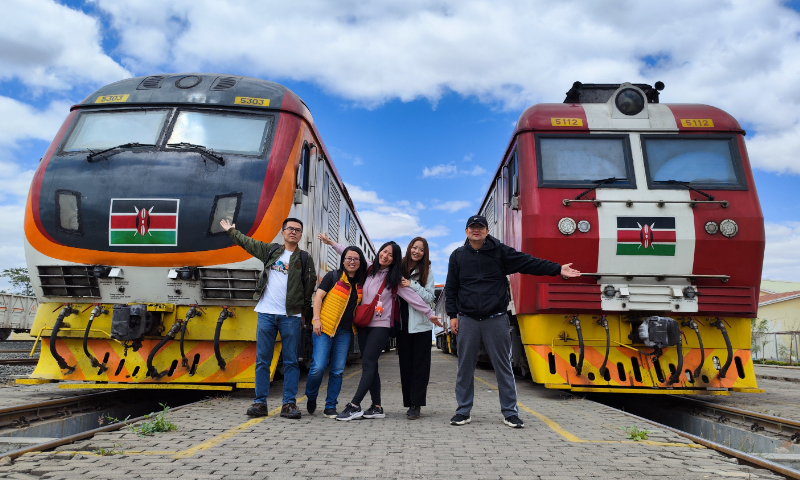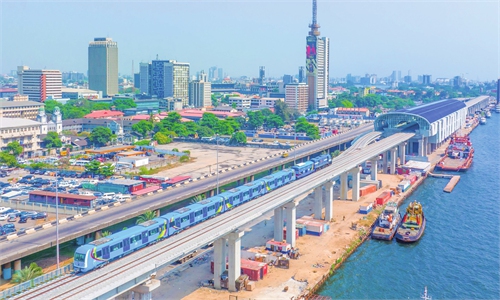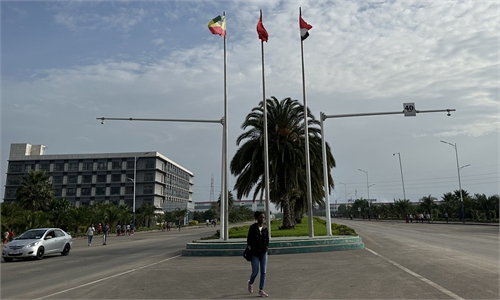GT on the spot: Young Africans actively learning China's experience

Local villagers wave goodbye to Global Times reporters in a suburb of Nairobi, Kenya on August 6, 2023. Photo: Tu Lei/GT
When standing on the vast farmland of Mahitsy, northwest of Madagascar's capital Antananarivo, we would feel a little bit confused, as the view is exactly the same as in southern China. We saw the cattle walking along the vast rice planting farmland, the red soil exposed under the sun after being plowed, and children running around the fields.But we were in the Africa, thousands of kilometers away from China. One is the largest developing country, and the other is the continent home to the largest number of developing countries. It is the China-proposed Belt and Road Initiative (BRI) that is bringing the two lands closer. The mutual exchanges between China and the Africa are getting much more frequent as China and Africa have continued to deepen their cooperation over the past decade.
We spent 10 days in Ethiopia, Kenya and Madagascar. In addition to the dedication of Chinese on the ground working on infrastructure, including ports, railways and roads for the locals to better interconnectivity, what impressed us most is that more and more ambitious local young people are eager to learn China's experience in various fields, and they hope to use what they would have learned to serve their countries someday. Such strong self-motivation has become a rising power behind their countries' development.

Helping hand
Hu Yuefang came to Madagascar 15 years ago. As a technician specializing in hybrid rice planting from the Hunan Academy of Agricultural Sciences, he is one of the first groups of experts coming to help the locals cultivate the hybrid rice.
He said when he first arrived in this land, there was no electricity or drinkable water, with only one big mattress that he had to share with his colleagues together. Many young people came for months and then left, being unable to deal with the living conditions and the low salary.
When Hu was asked how he had made it for 15 years, he said he was born as a farmer, and he was also reluctant to leave this place after having built a very close relationship with the locals. "When I leave one place, the locals always shed tears," he said.
He's skin is now dark with sunburn, and he can speak fluent local language. It's almost hard to tell him apart from the locals. And in particular, the hybrid rice Hu helps plant has been embraced by more and more local people.
The cumulative area planting Chinese hybrid rice in Madagascar has reached more than 50,000 hectares delivering higher yields, becoming an important component of local rice production.
Hu has some sort of stubborn characteristics, for he will not give up easily once he made up his mind. And such personality is also seen in many Chinese who devoted themselves to the local constructions.
Fei Rongwei, a civil engineer from the Beijing-based China Road and Bridge Corporation, also said his team, part of the whole construction group, had suffered through some tough times when upgrading the Route Nationale 5A of Madagascar, with COVID-19 making teamwork far more challenging.
His team had only 13 members for a long period of time, as people who should be on vacation were unable to return home, and new employees who need to be assigned to the project unable to travel to the project worksite. "It was a really challenge, as you will never know what will happen in the next day under the epidemic pressure," he recalled.
Fei's team persevered and the whole project was completed on time. The project, described as "the work of the century," was an infrastructure project long awaited by communities throughout the northern part of the Madagascar.
Project across Africa such as the Mombasa-Nairobi Standard Gauge Railway in Kenya, the Addis Ababa-Djibouti railway, Nigeria's Akka Railway and the East-West highway in Algeria are serving as important bridges, bringing people from China and Africa together.
Fei said that Chinese companies are highly trusted by local residents. In Madagascar, local governments and schools will always turn to Chinese companies. For example, local governments and schools will ask for help with repairs or minor construction work.
In return, local people actively cooperate when Chinese employees need to relocated their property or equipment during road construction. Passing drivers will also blow their horns when they see staff of Chinese companies working outdoors.
Locals had tried to seek help from Western companies in the past, but were always ignored. In comparison, the Chinese always lend a helping hand, Fei said.

Global Times reporters pose in front of trains at the Nairobi station of the Mombasa-Nairobi Standard Gauge Railway in Kenya on August 7, 2023. Photo: GT
Self-motivationThe word "diligent" is used frequently when interviewing Chinese working on the continent, no matter whether they are in Ethiopia, Kenya or Madagascar.
In the eyes of Abebe Negera, an Ethiopian employee working in an aluminum company for three years in the Oriental Industrial Park in Addis Ababa, the working style of Chinese enterprises is quite different from his previous government job. Chinese firms impose a strict work schedule to ensure daily targets are met. It seems that there is nothing impossible for Chinese in the face of challenges, with Chinese always being able to find a solution to any problem.
Subtly, his working experience in Chinese company has also changed his own lifestyle. He now teaches his children not to waste time, and now he also hopes his children will be able to study in China in the future.
A similar feeling is also shared by Melat Adugna Asnake, a 25-year-old young woman living in Addis Ababa, Ethiopia. She has been studying in China for seven years, and can speak fluent Chinese.
Currently, she is a second-year postgraduate student at Nanjing Medical University, after initially studying at nearby Soochow University located in East China's Jiangsu Province.
She has a 22-year-old younger brother who now is studying civil engineering at Tongji University in Shanghai. They will always share their online shopping experiences with family members and friends in Africa to let more people around them understand Chinese science and technology.
Although she is still a student, her mind is far beyond her age. She said Chinese people's hard work and intelligence had left a deep impression on her. She also said Chinese people have worked hard for 30 to 40 years to realize this achievement, and there is hope for Africa.
In Melat's view, there are a lot of challenges in Africa such as public health and medical care, and she is determined to become a doctor to serve her country after learning in China. She even said she would like to become a role model for more African girls.
Such stories have been dotted along our visits in the Africa, and we believe the stories, just like the seeds, will grow and mature in the hearts of the Africa people. The cooperative construction of the BRI has not only effectively built on policy communication, trade facilitation and infrastructure connectivity, but also fostered people-to-people exchanges between China and Africa. The exchanges and communication enhance mutual understanding and friendship, laying a solid foundation for unbreakable relations between the two countries for decades and even centuries to come.





